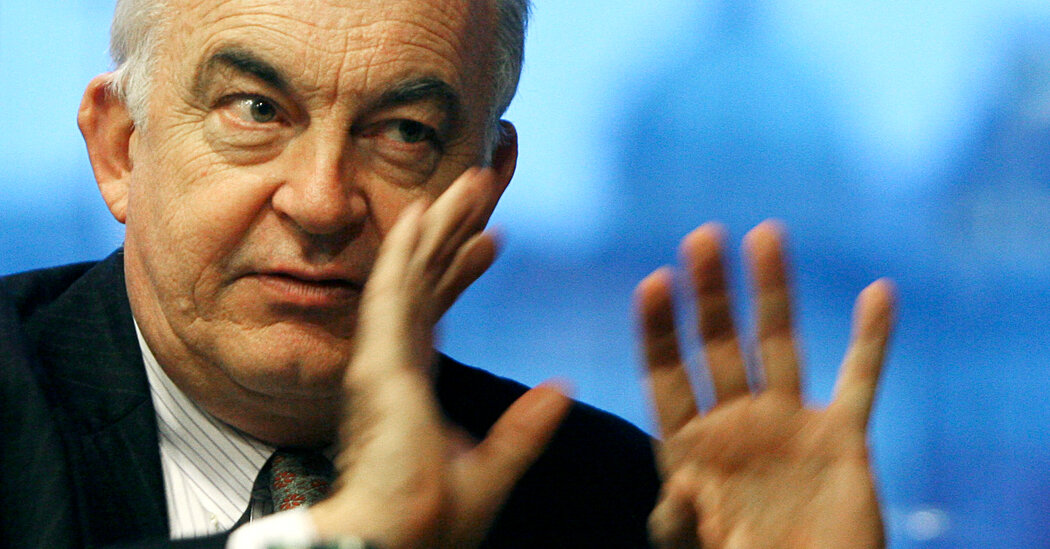Kemal Dervis, an economist who was instrumental in helping his native Turkey emerge from the economic crisis of the early 2000s, and who later became the first person to lead the United Nations Development Program from a country that had received development aid of the program, died on Sunday in Bethesda, Md. He was 74.
The Brookings Institution, where Mr. Dervis had been the director and vice president of the program for world economics and development and was a nonresident eminent fellow, confirmed his death. According to the Turkish state news agency Anadolu, he died of an unspecified illness.
Mr. Dervis had been working for the World Bank in various positions for two decades when prices skyrocketed in Turkey in early 2001 and the currency, the lira, plummeted. The journalist Andrew Finkel wrote in April of that year that “Turks have in their wallets 10 million lira bills, the highest bill in the world, and after the recent debacle, worth well under $10.”
The crisis is said to have been triggered by a disagreement between Turkey’s President, Ahmet Necdet Sezer, and Prime Minister, Bulent Ecevit, over the pace of anti-corruption efforts. Banks and financial markets reacted badly to the tiff. The collapse was swift and Mr Dervis, then Vice President of the World Bank, was seen as a savior.
“Ecevit, then the prime minister, called Dervis to come and help the country as minister,” M. Hakan Yavuz, a professor of political science at the University of Utah and an expert on Turkey, said by email. “He agreed and came to serve his country. His economic policies have laid the foundation for the great economic development between 2002 and 2020 in Turkey.”
Mr. Dervis assumed the newly created position of Minister of Economy. “Even Dervis’s name was enough” to calm the crisis, according to a headline in the Hurriyet newspaper, noting that the announcement of his appointment had boosted markets and lowered interest rates – for a day.
But dealing with the crisis was actually much more complicated. It required Mr Dervis to negotiate loans with the International Monetary Fund, push for systemic changes in the banking system, rein in corruption and initially cause quite a bit of pain through austerity.
“Don’t expect me to make a policy just for today to save us,” Mr. Dervis said in mid-April 2001. “We can’t push our future to save today.”
His policies ultimately ensured a sustained period of economic stability, a period that, according to Professor Yavuz, lasted until a few years ago, when President Recep Tayyip Erdogan backed away from Mr Dervis’ policies and allowed corruption.
Mr Dervis remained at the ministry for just over a year before running for a seat in parliament; he won, and continued to serve on that body until 2005. That year, Secretary-General Kofi Annan chose him to head the United Nations Development Agency, which helps countries eradicate poverty and create sustainable economies.
It was an appointment that made history: Mr. Dervis was the first to run the office and came from a country that had benefited from it. (Previous administrators had been American or British.)
Dervis, said Professor Yavuz, “always focused on the social impact of economic policies” and in his post at the United Nations “had a deep sense of help and concern for the vulnerable sector of the population.”
Dervis, a political social democrat, focused in particular on the impact of globalization on poorer populations and highlighted the expected effects of climate change, which he said would affect the poor in many countries.
Mr. Dervis joined Brookings after four years at the United Nations and continued to work on ways to make economies benefit everyone.
“He advanced a robust research agenda to strengthen the drivers of global growth, ensure no one is left behind,” the institution said in a statement, “and proposed policies on the future of global governance and the technological transformation of the global economy, with a special focus on productivity, inclusiveness, sustainability and international cooperation.”
Kemal Dervis was born on January 10, 1949 in Istanbul. He received a bachelor’s degree from the London School of Economics in 1968 and a master’s degree in economics there in 1970. In 1973 he received a Ph.D. from Princeton University, where he taught for some time in the 1970s, as well as at Middle East Technical University in Turkey.
Information about his survivors was not immediately available.
Professor Yavuz said Mr Dervis was often criticized – not only by the merchants in Turkey who felt his changes in 2001 were not helping fast enough, but also by leftists who thought he was not left-wing enough, and by Islamists and nationalists who viewed him as an agent of Western imperialism. But all the while, he said, Mr. Dervis was looking at the big picture.
“He cared about creating a socio-economic system so that every citizen could excel,” he said.

